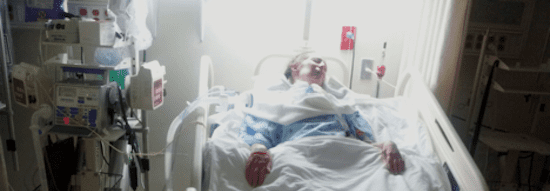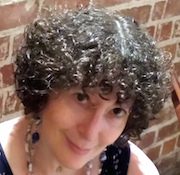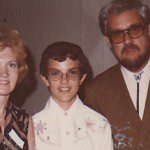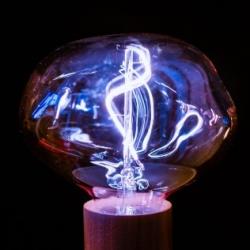By Stephanie Savage
While my doctors were shining lights in my eyes, trying to gauge my level of consciousness, I was asking them to leave me alone so I could get back to sleep…in what I call my coma-dream.
During my six-week coma, I experienced a phenomenon called covert cognition. Though my pupils responded to the light, I flunked most of their other tests. The doctors basically wrote me off as a vegetable. Ironically, it was the move to a nursing home—as they were warehousing this hopeless case rated as a poor candidate for rehabilitation—that finally spurred me to awaken. My doctors denied me physical therapy, yet every time I was physically stimulated, I woke up a little more.
Before I began researching my Skeptical Inquirer article, “Covert Cognition: My So-Called Near-Death Experience,” I knew nothing about covert cognition, AKA covert awareness, also called, “Hello! Please put a blanket on me; I’m cold!” The last one is something I would’ve told the medical personnel if I could. After my awakening, all I knew was that my doctors had written me off as a vegetable while I was aware of much of what was going on around me.
According to covert cognition researchers, as many as one in five patients with disorders of consciousness are covertly aware. Most aren’t as fortunate as I was. But at least one person is luckier still; he’s now rolling in money from his bestseller about his coma-dream, which he insists was Proof of Heaven.
In a future post, I will get into the reasons why I believe Eben Alexander’s near-death experience (NDE) was, like mine, just a form of coma-dream. But first I want to dive into the subject of covert cognition and why it negates the arguments for mind-brain separation in NDEs.

The case for mind-brain separation in NDEs is usually predicated on the assumption that NDEs occur when the brain isn’t working and is incapable of generating what the so-called experiencer perceived. But covert cognition researchers are finding that the brains of a significant portion of patients with consciousness disorders are still functioning at levels which can at present only be detected with rare and expensive diagnostic machines. In short, instead of being an on/off switch, consciousness is more of a dimmer.
As I detailed in the SI piece, when cognitive neuroscientist Adrian Owen was at Cambridge, he and his team succeeded in communicating with patients with no outward signs of awareness (much like Bristol Palin). One subject was actually able to tell them he wasn’t in pain.
This was not like facilitated communication. Dr. Owen and his fellow researchers devised an ingenious way to allow patients to answer biographical questions inside an fMRI machine. The patients imagined playing tennis or walking through their homes to choose yes or no. As they did so, their brain scans lit up in the motor or navigational areas, indicating which response the patient chose. Using this method, four patients were able to reply to the queries. One answered five of six correctly.
Sadly, that patient eventually died without regaining full consciousness. But the father of Jeff Tremblay now knows he was right when he sensed that his son was able to enjoy the movies he’s been taking him out to see every weekend for more than a decade.
Jeff took part in the Hitchcock study conducted by the Owen Lab at Western University (see also the SI article), in which a condensed version of “Bang! You’re Dead,” a classic episode of Alfred Hitchcock Presents, was presented as the participants’ brains were imaged by an fMRI machine. Jeff’s brain patterns proved to be identical to that of the study’s healthy controls. That means he was following every suspenseful plot twist. Peter Tremblay reports, however, that Jeff’s favorite genre is comedies, to which he responds with a big belly laugh.
Dr. Owen’s goal to make covert cognition detection widely available using EEGs is still in its infancy, yet he’s already discovered Kate Bainbridge’s covert awareness via PET scan and given comfort to Peter Trembley. Kate received therapy after her awareness was uncovered. Although she is severely disabled physically, Kate is now fully conscious. Her life is far from easy, yet she’s expressed her tremendous gratitude to Dr. Owens for discovering that’s she’s “in there,” as she has put it.
These are of course the extreme ends of the spectrum. Yet, it’s evident that extensively-damaged brains are capable of functioning at levels that were once unsuspected. Proof of Heaven rests on the assumption that Eben Alexander’s cerebral cortex was “totally off-line,” too ravaged by E. coli meningitis to be responsible for his NDE — the equivalent of brain death. He seems awfully spry for someone who should be a candidate for organ harvesting. If his cortex had truly been destroyed, he wouldn’t be writing books and making appearances on Oprah.
Rather than list all the reasons Alexander’s ridiculous assertion is unsupportable, I will point to Sam Harris’s highly cogent dissection: This Must Be Heaven.
Though Alexander calls himself a scientist throughout Proof of Heaven, he is in fact a neurosurgeon. That’s like your plumber claiming the credentials to design your city’s sewage treatment system. Sam Harris, on the other hand, is an actual neuroscientist. I’m not a scientist or a doctor, but I am a person who experienced a complex coma-dream while my doctors proclaimed me profoundly brain damaged and assumed I was a hopeless vegetable. Is covert cognition really harder to accept than the idea that our thoughts and feelings exist outside the brain, floating free of the body like my mind did during math class?
Covert cognition has profound implications for people alleged to have had no brain function. When Dr. Owen and his team finally succeed in making covert cognition detection portable and inexpensive, I think we’ll find that the brains of these experiencers are far more active than those of the NDE true-believers wedded to the notion that the mind exists separately from the brain.
Full disclosure: I’m now working with Dr. Owen to a small degree via email. He said he would be asking me questions about my covert cognition experience as he reaches the relevant chapters of his new book for the popular market. I look forward to helping him in any way I can because I’m now passionate about informing the public about the plight of the covertly aware.
 STEPHANIE SAVAGE started out as a writer of satirical fiction with a skeptical and humanist bent. When she suffered multiple strokes and fell into a six-week coma, she emerged with a mission to tell her story and fight for the cause of reason using nonfiction.
STEPHANIE SAVAGE started out as a writer of satirical fiction with a skeptical and humanist bent. When she suffered multiple strokes and fell into a six-week coma, she emerged with a mission to tell her story and fight for the cause of reason using nonfiction.
Her work has appeared in such magazines as Skeptical Inquirer and Free Inquiry, including her article, “Covert Cognition: My So-Called Near-Death Experience,” which explained how covert cognition like she experienced could disprove mind-brain separation. She also writes a blog that explores the skeptical and humanist aspects of her experience.
















